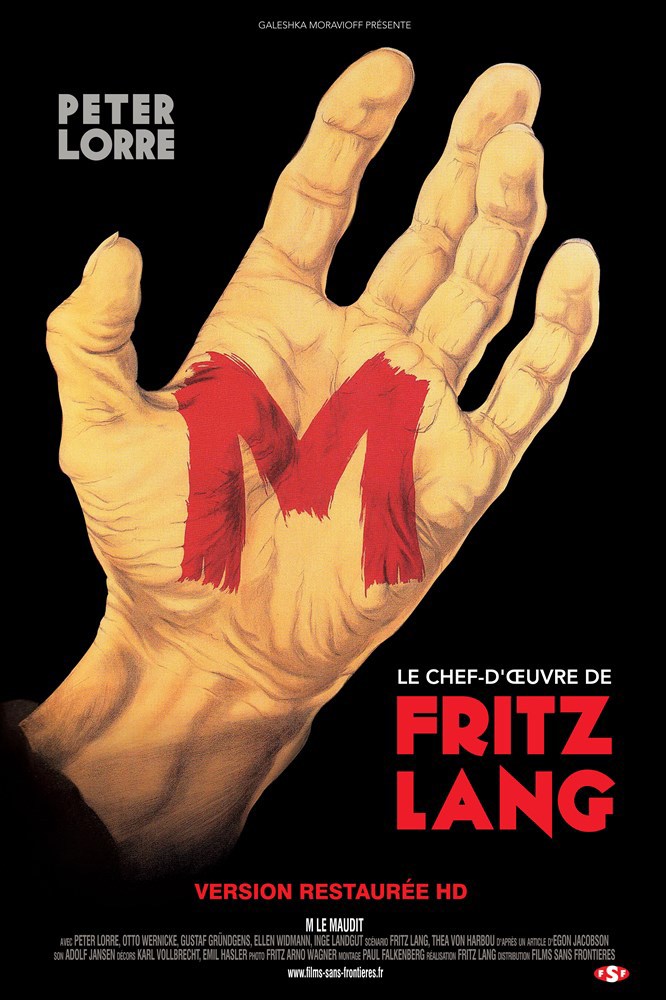M (1931) – A Masterpiece of Suspense and Psychological Horror
Type: Movie
Country: Germany
Genre: Crime, Thriller, Drama
Release Date: May 11, 1931
Duration: 110 minutes
Director: Fritz Lang
Production Companies: Nero-Film AG
Cast: Peter Lorre, Ellen Widmann, Inge Landgut, Otto Wernicke
Quick Review:
“M” (1931), directed by Fritz Lang, is a groundbreaking film that masterfully blends crime, thriller, and psychological horror elements. This German classic, known for its innovative use of sound and intense narrative, remains a pivotal work in the history of cinema. Peter Lorre’s chilling performance and Lang’s meticulous direction make “M” a timeless and compelling exploration of the human psyche.
Plot Summary:
Set in a gloomy, post-World War I German city, “M” follows the story of a community terrorized by a child murderer. The elusive killer, Hans Beckert (Peter Lorre), preys on young children, leaving the city in a state of constant fear and paranoia. As the police intensify their efforts to capture the murderer, they conduct frequent raids and questioning, which disrupts the criminal underworld’s operations.
Frustrated by the increased police presence and interference, the city’s crime syndicate decides to take matters into their own hands. Utilizing their network of beggars and informants, they launch a parallel manhunt to find the murderer. This leads to a gripping climax where both the police and the criminals close in on Beckert, resulting in a tense and dramatic confrontation.
Characters and Performances:
- Peter Lorre (Hans Beckert): Lorre delivers a haunting and unforgettable performance as the deranged child murderer. His portrayal of Beckert’s inner torment and madness is both chilling and empathetic, making him one of cinema’s most memorable villains.
- Otto Wernicke (Inspector Karl Lohmann): Wernicke brings a determined and methodical presence to the role of Inspector Lohmann. His character represents the relentless pursuit of justice amidst the chaos.
- Gustaf Gründgens (Schränker): Gründgens plays the leader of the criminal underworld with authority and charisma. His performance highlights the desperation and resourcefulness of the city’s criminals.
- Ellen Widmann (Mrs. Beckmann): Widmann’s portrayal of a grieving mother adds a poignant human element to the film, illustrating the devastating impact of Beckert’s crimes on the community.
Direction and Cinematography:
Fritz Lang’s direction is nothing short of visionary. His use of shadow and light creates a claustrophobic and oppressive atmosphere that mirrors the film’s themes of fear and hysteria. Lang’s meticulous attention to detail and innovative techniques, such as the use of off-screen sound and voiceovers, enhance the suspense and psychological depth of the narrative.
The cinematography by Fritz Arno Wagner is equally remarkable. The film’s expressionist visual style, with its stark contrasts and angular compositions, heightens the sense of unease and tension. Wagner’s use of deep focus and dynamic camera angles captures the urban landscape’s gritty realism, making the city itself a character in the story.
Music:
“M” is notable for its pioneering use of sound in cinema. Rather than a traditional musical score, Lang employs sound to build tension and enhance the narrative. The eerie whistling of “In the Hall of the Mountain King” by Edvard Grieg, used by Beckert, becomes an ominous motif that signals his presence and impending danger. This innovative use of sound design was groundbreaking at the time and remains highly influential.
Why It Endures:
“M” endures as a classic for its masterful storytelling, innovative techniques, and profound psychological insights. Fritz Lang’s direction, combined with Peter Lorre’s iconic performance, creates a film that is both a gripping thriller and a deep exploration of human nature. The film’s themes of justice, morality, and societal fear are timeless, resonating with audiences across generations.
Its influence on the crime thriller genre and its pioneering use of sound cement “M” as a landmark in cinematic history. The film’s ability to evoke intense emotional responses and provoke thoughtful reflection on human behavior ensures its lasting legacy.
In Conclusion:
“M” (1931) is a masterpiece that remains as powerful and relevant today as it was upon its release. Fritz Lang’s direction, Peter Lorre’s unforgettable performance, and the film’s innovative use of sound and cinematography make it a seminal work in the history of cinema. “M” is a must-watch for anyone interested in the evolution of film and the enduring power of suspenseful storytelling.


